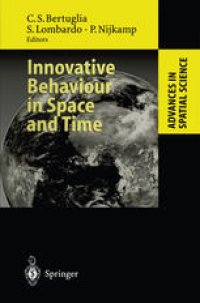
Ebook: Innovative Behaviour in Space and Time
- Tags: Regional/Spatial Science, Geography (general), Landscape/Regional and Urban Planning
- Series: Advances in Spatial Science
- Year: 1997
- Publisher: Springer-Verlag Berlin Heidelberg
- Edition: 1
- Language: English
- pdf
In the past decade there has been growing recognition that economic development is not mainly exogenously determined but, to a large extent, is a transformation process induced and governed by economic actors who respond to competitive, institutional and political challenge. This 'challenge and response' model is increasingly accepted as a valid analytical framework in modem growth theory and also explains the popularity of endogenous growth approaches to technological innovation issues. However, a major and as yet largely under-researched topic is the question of the diffusion and adoption of new technological changes in the context of space-time dynamics. This diffusion and adoption pattern has obviously clear spatial and temporal variations connected with behavioural responses which may vary over time and different locations. This means that a closer analysis of spatio-temporal opportunities and impediments is necessary in order to fully map the complex interactions of technology and economy in space and time. This volume sets out to bring together a collection of original contributions commissioned by the editors to highlight the spatio-temporal patterns and backgrounds of the diffusion and adoption of new technologies. Some are in the nature of a survey, others.have a modelling background and again others are case studies. The contributions originate from different countries and different disciplines. This book is complementary to a previously published volume on technological innovation, Technological Change, Economic Development and Space, edited by C.S. Bertuglia, M.M. Fischer and G. Preto, and also published by Springer-Verlag (1995).
This book offers an in-depth investigation of the role of new information technology in industrial restructuring processes. It focusses on the strategic function of the network and the urban milieu in providing favourable conditions for economic growth and analyzes the forces governing the production and adoption of innovation with particular emphasis on their impact on spatial organization over time.